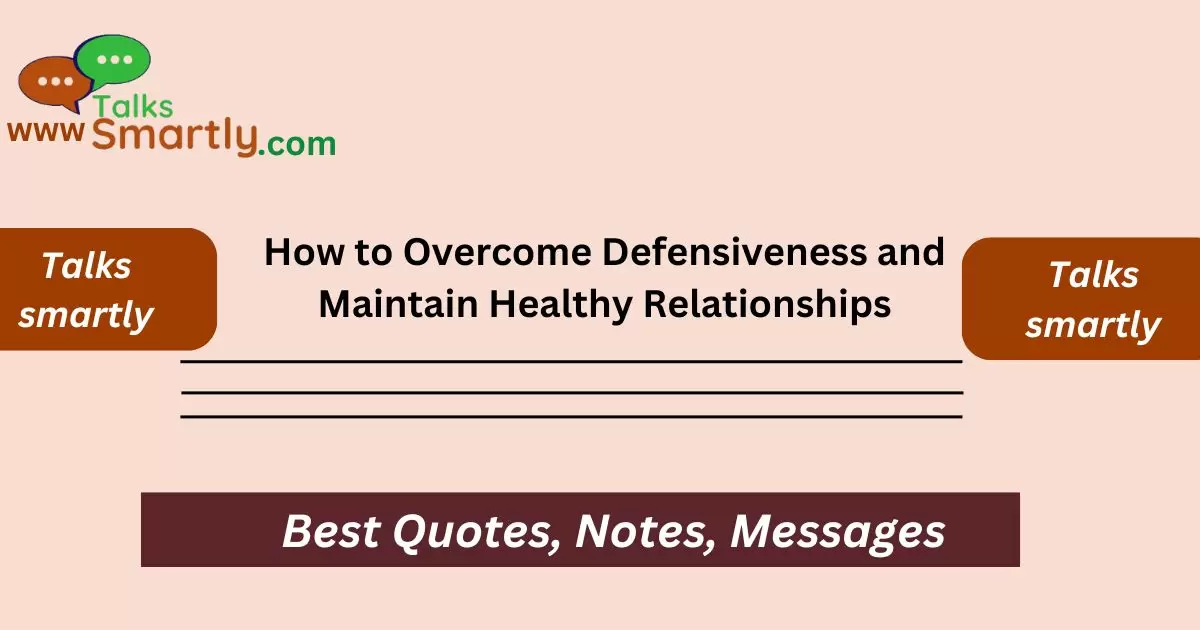Introduction
“To overcome defensiveness, focus on active listening and empathy. This approach fosters open communication and strengthens healthy relationships.“
Defensiveness can harm our relationships and prevent us from connecting with others. It often stems from fear or insecurity and can lead to misunderstandings. Learning to overcome defensiveness is essential for building strong and healthy relationships. This article provides practical tips to help you manage and reduce defensive behaviour.
Take a moment to reflect on your own behaviour and how you react during conversations. Practise the strategies outlined here to improve your interactions and build stronger connections. Start using these tips today to foster open and honest communication in your relationships.
In this article, you’ll learn how to recognize and address defensive behaviour. We cover common signs of defensiveness, explore its root causes, and offer practical advice on overcoming it. You’ll also discover the benefits of embracing vulnerability and adopting non-defensive communication strategies. These insights will help you create more positive and meaningful relationships.
Recognizing Defensive Behaviour
Defensive behaviour can manifest in various ways, often as a reaction to perceived threats or criticism. Recognizing these behaviours is the first step toward addressing and overcoming them. Here are ten common indicators of defensiveness:
- Dismissing or Minimising: Ignoring or belittling feedback or concerns from others.

- Overreacting: Responding to criticism with intense anger or frustration.
- Blaming Others: Shifting responsibility to others instead of accepting it.
- Justifying: Offering excuses or rationalisations to deflect blame.
- Stonewalling: Withdrawing from conversation or shutting down communication.
- Interrupting: Cutting off others to prevent them from expressing their thoughts.
- Being Condescending: Talking down to others or making them feel inferior.
- Deflecting: Changing the subject to avoid discussing the issue at hand.
- Sarcasm: Using mocking or sarcastic remarks to undermine the other person.
- Playing the Victim: Portraying oneself as the injured party to gain sympathy.
Recognizing these behaviours can help you understand when you or someone else is being defensive. Awareness is the first step in making positive changes.
Decoding the Root Causes
Understanding the root causes of defensiveness is essential for addressing it effectively. Here are some common factors that contribute to defensive behaviour:
- Insecurity: Feeling inadequate or fearing judgement can lead to defensive reactions.
- Previous Trauma: Past experiences of criticism or rejection can trigger defensive responses.
- Fear of Failure: Anxiety about making mistakes can cause defensiveness as a protective mechanism.
- Perceived Threats: Feeling threatened or attacked can result in defensive behaviour to shield oneself.
- Low Self-Esteem: A lack of confidence may make individuals more prone to defensiveness.
- Miscommunication: Misunderstandings can be interpreted as personal attacks, leading to defensiveness.
- Unresolved Conflict: Ongoing issues or past grievances can exacerbate defensive behaviour.
- Stress: High levels of stress can make individuals more reactive and defensive.
- Cultural Influences: Cultural norms and values can impact how defensiveness is expressed and perceived.
- Personality Traits: Certain personality traits, such as being highly sensitive, can increase defensiveness.
Hilarious Ways to Shut Down Unwanted Texts
Real-Life Example
Consider Jane, who often reacts defensively when her partner provides feedback about household chores. Jane’s defensiveness stems from past experiences where her contributions were undervalued. By recognizing this root cause, Jane and her partner can work together to address her insecurities and improve communication.
Tips for Overcoming Defensiveness
Overcoming defensiveness involves both self-awareness and active effort. Here are fifteen practical tips to help you address and reduce defensive behaviour:
- Practice Self-Reflection: Take time to examine your own responses and identify triggers for defensiveness.
- Acknowledge Your Feelings: Recognize and accept your emotions without letting them dictate your reactions.
- Listen Actively: Focus on truly hearing the other person’s perspective without immediately reacting.
- Take a Pause: If you feel defensive, pause before responding to allow yourself time to process the information.
- Ask Clarifying Questions: Seek to understand the other person’s point of view rather than assuming their intentions.
- Use “I” Statements: Express your feelings and needs using “I” statements to avoid sounding accusatory.
- Stay Calm: Practice techniques for managing stress and staying composed during discussions.

- Seek Feedback: Request constructive feedback from trusted individuals to gain insight into your behaviour.
- Develop Empathy: Try to understand and appreciate the emotions and experiences of others.
- Focus on Solutions: Shift the conversation toward finding solutions rather than dwelling on problems.
- Avoid Blame: Resist the urge to blame others and instead focus on collaborative problem-solving.
- Practice Mindfulness: Use mindfulness techniques to stay present and manage your emotional responses.
- Improve Communication Skills: Work on enhancing your communication skills to express yourself more effectively.
- Seek Professional Help: Consider therapy or counselling to address underlying issues contributing to defensiveness.
- Build Self-Confidence: Engage in activities that boost your self-esteem and reduce the need for defensive behaviour.
Real-Life Example
John, who frequently becomes defensive during team meetings, started using active listening techniques and asking clarifying questions. Over time, he noticed a reduction in his defensiveness and improved relationships with his colleagues.
The Power of Vulnerability
Vulnerability plays a crucial role in overcoming defensiveness. It involves being open and honest about your feelings and experiences, even if it feels uncomfortable. By embracing vulnerability, you can foster deeper connections and trust in your relationships.
Five Points on the Power of Vulnerability
- Fosters Trust: Sharing your true feelings builds trust and understanding with others.
- Encourages Openness: Vulnerability encourages others to be open and honest in return.
- Reduces Anxiety: Being open about your emotions can lessen the fear of judgement or rejection.
- Promotes Empathy: Expressing vulnerability helps others empathise with your experiences and emotions.
- Strengthens Relationships: Genuine connection and communication are strengthened through vulnerability.
The Benefits of Non-Defensive Communication
Non-defensive communication promotes healthy and constructive interactions. It allows for open dialogue and mutual understanding, reducing conflict and enhancing relationships.
Ten Benefits of Non-Defensive Communication
- Enhances Understanding: Promotes clearer communication and better understanding between individuals.
- Reduces Conflict: Minimises arguments and disagreements by focusing on collaboration rather than confrontation.
- Builds Trust: Creates a foundation of trust and respect in relationships.
- Encourages Openness: Facilitates honest and open discussions without fear of judgement.
- Strengthens Relationships: Fosters stronger connections through effective and empathetic communication.
- Promotes Problem-Solving: Encourages joint problem-solving and finding mutually beneficial solutions.
- Increases Emotional Intelligence: Enhances awareness and management of one’s emotions and responses.

- Reduces Stress: Lowers stress levels by avoiding unnecessary conflict and tension.
- Fosters Collaboration: Supports cooperative efforts and teamwork in achieving common goals.
- Improves Self-Awareness: Helps individuals become more aware of their own behaviour and its impact on others.
Conclusion
In conclusion, overcoming defensiveness is crucial for cultivating and maintaining healthy relationships. By recognizing defensive behaviours and understanding their root causes, individuals can address underlying issues and communicate more effectively. Implementing practical tips for overcoming defensiveness, such as practising active listening and using “I” statements, fosters open and honest dialogue.
Embracing vulnerability not only builds trust but also enhances emotional connections and personal growth. The benefits of non-defensive communication are evident in improved understanding, stronger relationships, and a positive environment. Committing to these practices helps create a more empathetic and supportive atmosphere, leading to more meaningful interactions.
Remember, the journey toward better communication is ongoing and requires continuous effort and self-awareness. By applying these principles, you can foster healthier and more rewarding relationships, ultimately enhancing your personal and professional life.












